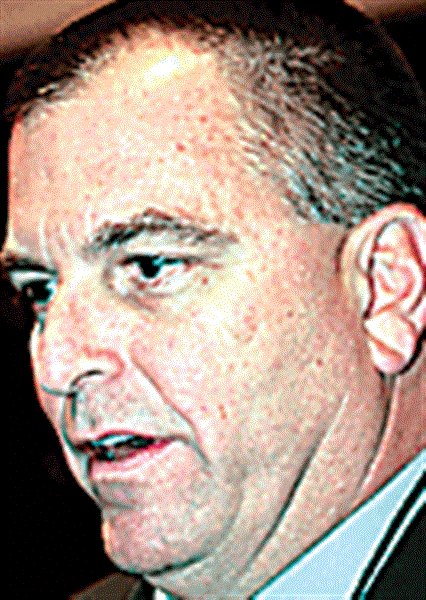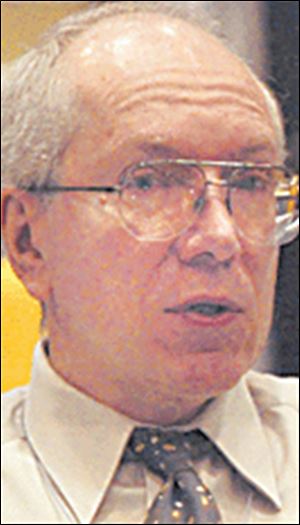
Records track flow of state cash to Noe companies
8/3/2005
Noe
COLUMBUS From the first days of Ohio s $50 million rare-coin investment, money flowed to coin dealers across the country and into the personal business accounts of Tom Noe.
With the first $25 million, Mr. Noe quickly invested money into real estate and his associates coin businesses, and he brokered multimillion dollar coin deals that made the state little money but that allowed him to unload his coins for hundreds of thousands to the state, according to rare-coin records released yesterday by the state.
At the center of the millions in deals was Rare Coin Enterprises LLC, the company Mr. Noe created and infused with $2 million nine days after he received the first $25 million in rare-coin money from the Ohio Bureau of Workers Compensation.
With the first cash from the state, Mr. Noe created Capital Coin Fund Limited, but that rare-coin face of the state would remain behind the scenes, intentionally.
The April 10, 1998, transfer of $2 million was followed by a $1.5 million transfer from Capital Coin Fund Limited on May 4; a $2 million transfer on May 26; a $5 million transfer on Sept. 8, and $500,000 transfers on Sept. 15, Oct. 19, and Nov. 25 all to Rare Coin Enterprises, a separate partnership controlled by Mr. Noe and Frank Greenberg, that was never mentioned in the operating agreement Mr. Noe signed with the state.
Mr. Greenberg, who owns Delaware Valley Rare Coin in Broomall, Pa., was also Mr. Noe s original partner in Capital Coin.
The first thing we did was to create Rare Coin Enterprises, Mr. Noe said in an interview in March. We made Rare Coin Enterprises our public company out there that everybody looked at. Nobody knew Capital Coin Fund existed.
The subsidiary would guarantee loans and coin deals and serve as a transfer point for millions in coin deals:
• Using Rare Coin Enterprises as the conduit, Mr. Noe set up a complicated deal with Heritage Capital Corp. to buy and sell $5 gold pieces from the world-famous Trompeter Collection. Mr. Noe used $5 million from the state s Capital Coin Fund Limited for the deal, but the state only made about $120,000. Mr. Noe also sold 20 of his own coins to the state to make up a $508,553 shortfall in the deal.
The sale of those 20 coins from Vintage Coins and Collectibles Mr. Noe s Monclova Township firm to the state s coin fund happened to be priced within pennies of the exact amount Mr. Noe needed to close the gap in the deal. Mr. Noe might not have needed to move the coins which he priced himself and then sold to the state because Vintage was part of the structure of companies and held some of the state s inventory.
An analysis of the 20 coins Mr. Noe priced for sale to the state shows that some were overpriced, according to a review of retail prices from 1998, and some had grades listed so high as to be among the rarest of the rare, so that a price record did not exist.
• Records also show that in May, 2001, Mark Salzberg, a grading firm executive, sold $2 million worth of coins, some to Mr. Noe personally, some to Mr. Greenberg personally, and others to Rare Coin Enterprises, Vintage, and Delaware Valley. Even though Mr. Noe and Mr. Greenberg were buying coins personally, Rare Coin Enterprises, the state-funded subsidiary, guaranteed the full $2 million purchase.
At the request of Mr. Salzber [sic] all coins included in this agreement were guaranteed by Rare Coin Enterprises LLC, according to a letter written on Rare Coin Enterprises letterhead.

Greenberg
Mr. Noe, within months of beginning the state s coin fund, invested in a central-city real estate firm, far afield from the world of rare coins.
In 1998, some of the first major expenses of the coin funds included loans to the controversial Westhaven Group, a firm that buys and sells central-city homes.
From the time Mr. Noe received his first installment of $25 million from the state on March 31, 1998, until the end of the year, the former Toledo-area coin dealer lent $602,000 to the mortgage company run by John Ulmer. The loans were secured by mortgages.
Mr. Ulmer has been criticized for purchasing and repairing homes in lower-income parts of Toledo and reselling them with above-average mortgage interest rates. He could not be reached for comment last night.
State Sen. Teresa Fedor (D., Toledo), who has criticized Mr. Noe s dealings with Mr. Ulmer, said yesterday that the fact that the coin dealer began his transactions with the lender so quickly raises questions.

It seems as though Tom Noe knew what he wanted to do with that money before he even got it, Ms. Fedor said. None of it looks good.
Mr. Noe made his first loan from Rare Coin Enterprises to Westhaven on July 29, 1998, issuing $200,000 cash to the lending firm, according to the subsidiary s ledger. On Aug. 24, 1998, Mr. Noe sent another loan of $50,000 to Westhaven. In September and October of 1998, he issued another $352,000 in loans to Westhaven.
Millions were also spread out to coin dealers and coin subsidiaries by the end of 1998, coin records show.
By the end of the first year of operations, $4.6 million was owed by Mark Chrans and Visionary Rare Coins, a Noe subsidiary that Mr. Chrans was hired to manage; $2 million was listed on consignment with Delaware Valley Rare Coins, and Mr. Noe s company, Vintage Coins and Collectibles, was listed as holding $889,447 on consignment.
The hiring of Chrans to run a state-funded subsidiary was one of Mr. Noe s first rare-coin decisions on behalf of the state.
The ex-convict facing bankruptcy back in 1998 cost Ohio a total of $1.2 million, the sum of unpaid loans, soured deals, and salary advances.
He landed in federal prison, convicted of doctoring business records in 1981 to mask a $33,000 cocaine deal.
Chrans hid the drug money as checks drawn on his Springfield, Ill., coin shop. Chrans lied to IRS agents and to a grand jury, which resulted in convictions for defrauding the government and for perjury.
On April 25, 1986, U.S. District Court Judge Richard Mills sentenced Chrans to five years probation for the fraud and one year in prison for the perjury.
Eleven years later Chrans had settled in Malibu, Calif. Mr. Noe said he never ran a background check on his partner.
On April, 20, 1998, Rare Coin Enterprises gave $1.5 million to Visionary Rare Coin, run by Chrans. Rare Coin Enterprises had been created 12 days earlier.
Visionary cashed six-figure checks with the memo line funding throughout 1998.
According to Rare Coin Enterprises ledger, Visionary received $4.5 million. Rare Coin Enterprises also gave $551,522 in loans to Visionary, which repaid $301,522.55 before the start of 1999.
In the end, Mr. Noe s coin fund had to write off more than $850,000 from Visionary. It included $128,583 from an unpaid loan to Chrans and more than $335,000 in advances to him that were paid in anticipation of profitable coin deals. Visionary also recorded a business loss of $359,646 from bad coin deals.
Noe coin fund records released by the attorney general s office also show:
• Noe coin subsidiary Rare Coin Alliance, in Wilmington, Del., bought three 500-gram gold bars for $15,276 fromTokyo Rare Co. Ltd. in Japan,
• The state s money was spent on expensive dinners at upscale eateries, including a $447 dinner at Mitchell s steakhouse in Columbus in April, 2002; a $869 dinner at Morton s of Baltimore in December, 2003, and a $646 dinner at Vito s Chophouse in Orlando in January, 2004.
Blade staff writers James Drew and Joshua Boak contributed to this report.
Contact Christopher D. Kirkpatrick at: ckirkpatrick@theblade.com or 419-221-1766.